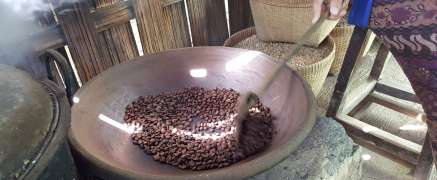Indonesia is the world’s third largest coffee producer with a market share of 7%.
- As diverse as the country with its more than 17,000 islands and more than 300 ethnic groups, so is the coffee in Indonesia!
- The most famous coffee comes from the island of Java.
- In 1699 Arabica plants of Yemenite origin were imported by the Dutch from India.
- The many volcanoes offer the best natural conditions for cultivation of coffee in Indonesia.
- In 1877, most of the Arabicas were infested with coffee rust and were replaced by Robusta plants from Africa.
- Today, the country produces 10 % Arabica / 90 % Robusta.
Advertisment
- The island state is after Vietnam the largest exporter of Robusta coffee.
- Cultivated areas are: Sumatra, Sulawesi, Java, Bali, Flores and Papua.
- Among the rarities are: the most expensive coffee in the world – Kopi Luwak, Worm Bitten Menados and Indonesian Warehouse Coffee.
- At the Worm Bitten Menados small farmers bury the coffee beans in the earth, where they are nibbled by worms.
- The Warehouse Coffee is similar to the Indian monsooning: when the coffee was still transported by sailing ships, the long storage gave it a taste of its own. A similar taste is achieved today by the afterripen in special storage houses. It is sold as Old Government, Old Brown or Old Java.
- The taste of Indonesian coffee is the opposite of the Latin varieties.
- It has a soft aroma, a full body and an earthy taste, partly with light herbal notes.
- With their sharp, deep and lasting taste, they are considered the coffee as “heavyweights“
- Especially the coffee of Sumatra has a viscid body and contains almost no acid
- That is why they are often contained in blends like the well-known “1699“, a mixture of beans from Java and Yemen.
Advertisment
Coffee in Indonesia – Traditional Preparation
Kopi Tubruk
- Common preparation of coffee in Indonesia
- Add 1-2 tbsp very finely ground coffee powder into a medium-sized cup together with some sugar and stir well.
- Leave the coffee set for 3-5 minutes and then drink.
- similar to turkish coffee.
Kopi Susu
- Kopi Tubruk is prepared with 1/4 – 1/2 sweet condensed milk instead of sugar.
Kopi Jahe
- 6 tbsp coffee powder, 1.5 l water, 5-6 tsp fresh ginger, 100 g palm sugar* and optionally 2 cinnamon sticks* and 3 cloves* together, boil at medium heat.
- Reduce heat and allow to simmer with stirring until the sugar is dissolved.
- After 5 minutes remove from the heat and spread through a cloth on 6 cups.
Advertisment
Kopi Joss
Charcoal coffee. Served with a piece of red hot charcoal dunked in, which is known for its health benefits – just remove the coal first 😉
kopi putih
also called white coffee, refers to coffee beans which are roasted shorter and lower heat than regular coffee beans. It has a savory and mild taste and a higher concentration of caffeine.
Daun Kopi
- Coffee-leaf tea (teh daun kopi) with the lower caffeine content is also a coffee alternative.
- For this, 9-12 g tea are brewed with 350-400 ml of 96 °C. hot water. Then leave it for 4-6 min.
- The green tea-like drink is drunk from coconut shells.
Es Alpukat / Jus Alpukat
- Means iced avocado.
- Blend 1 big ripe avocado, 1 cup strong cooled coffee, 2 cups milk, 1/4 cup pandan syrup* (alternatively: maple syrup*)
- Decorate a glass with chocolate syrup*, add ice cubes and the avocado coffee.
- Instead of milk and syrup you can also use almond milk and sweetened condensed milk.
Coffee in Indonesia
- Wild Kopi Luwak*
- Sumatra – Orang Utan Kaffee*
- Palau Kopi*
- Flores Bajawa*
- Mandheling Bio*
- Gayo (Rohkaffee)
For advertising links on this page the dealer may pay a commission. These advertising links are marked with an asterisk (*) – images and banners are marked with “Ads” or “Advertisment”. There are no costs for you. Find more information in the data protection regulations here.











